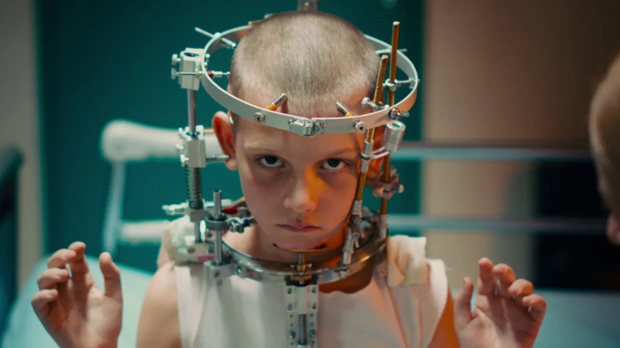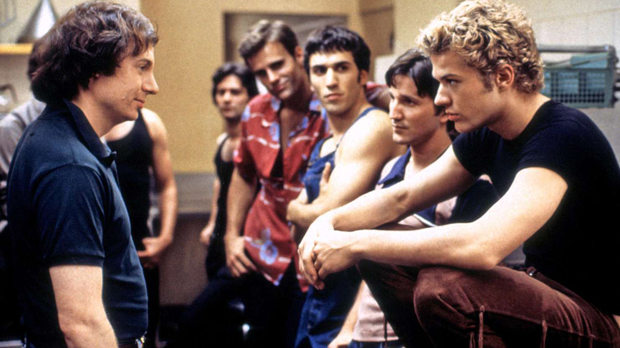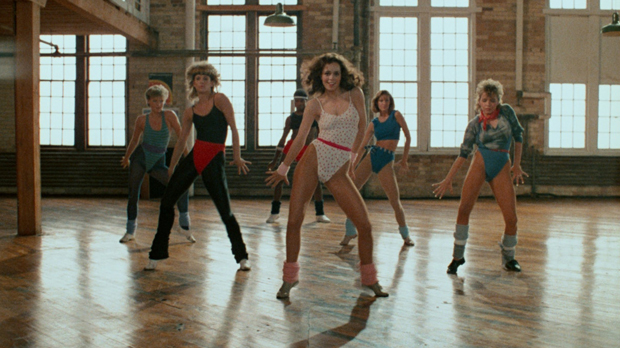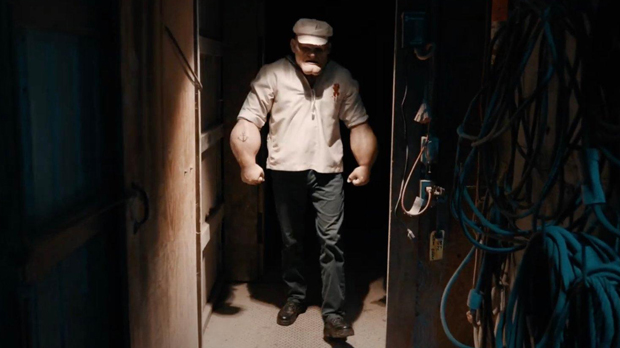 Titane (2021) Neon/Horror-Thriller RT: 108 minutes Rated R (strong violence and disturbing material, graphic nudity, sexual content, language) Director: Julia Ducournau Screenplay: Julia Ducournau Music: Jim Williams Cinematography: Ruben Impens Release date: October 1, 2021 (US) Cast: Vincent Lindon, Agathe Rousselle, Garance Marillier, Lais Salameh, Mara Cisse, Marin Judas, Diong-Keba Tacu, Myriem Akheddiou, Bertrand Bonello, Adele Guigue. Box Office: $1.4M (US)/$4.9M (World) Spoken in French w/English subtitles
Titane (2021) Neon/Horror-Thriller RT: 108 minutes Rated R (strong violence and disturbing material, graphic nudity, sexual content, language) Director: Julia Ducournau Screenplay: Julia Ducournau Music: Jim Williams Cinematography: Ruben Impens Release date: October 1, 2021 (US) Cast: Vincent Lindon, Agathe Rousselle, Garance Marillier, Lais Salameh, Mara Cisse, Marin Judas, Diong-Keba Tacu, Myriem Akheddiou, Bertrand Bonello, Adele Guigue. Box Office: $1.4M (US)/$4.9M (World) Spoken in French w/English subtitles
Rating: *** ½
Raw, the debut feature of writer-director Julia Ducournau, is a hard act to follow. A coming-of-age story that uses cannibalism as a metaphor for a teenage girl’s sexual awakening; there’s never been anything like it before or since. Topping it would be a tall order for the most experienced of filmmakers. She nonetheless rises to the occasion with her sophomore effort Titane, an insane piece combining grotesque body horror and psychological terror with its story of an extremely disturbed young woman with a thing for cars. The winner of this year’s Palme d’Or prize at Cannes, it’s a bold and wholly original film that will definitely have mainstream viewers running for the exits. It’s not for everybody’s tastes as you’ll soon learn.
A childhood car wreck, one that she causes in the film’s prologue, leaves Alexia (newcomer Rousselle) with a titanium plate in her skull and a huge scar on the side of her head that she displays like a badge of honor. It also leaves her sexually attracted to cars. As an adult, she makes a living as a dancer; specifically, the kind that performs at auto shows. She’s a minor celebrity of sorts; her fans are mainly guys turned on by her writhing and slithering all over sleek, shiny muscle cars. Not exactly a people person, Alexia is indifferent to the adoration thrown her way. One night, she’s approached in an empty parking lot by a horndog who wants more than her autograph. She responds to his unwanted advances by ramming her sharp chopstick hairpin right into the creeper’s ear, killing him. It doesn’t appear to faze her at all leading the viewer to believe she’s done this sort of thing before.
Okay, so our protagonist is a cold-blooded serial killer. That’s not the weird part of the twisted tale. In what can only be described as massively f***ed up, Alexia has sex with a car and becomes pregnant. Oh yeah, you read that right. I’ll say it again. Alexia has sex with a car and becomes pregnant. It only makes her more mentally unstable. After committing a few more murders, she tries to run, but realizes she can’t hide unless she does something drastic. She decides to assume the identity of a boy that went missing ten years earlier. She chops off her hair, tapes down her breasts and bulging stomach and breaks her nose before turning herself in to the police as the missing boy Adrien.
If you think that’s crazy, just wait until you hear what happens next. The boy’s father Vincent (Lindon, The Measure of a Man) accepts this obvious poser as his long-absent son. To be fair, he has issues of his own. A fire chief, he injects steroids into his muscular body in an attempt to ward off the effects of aging. He wants to be as young as the men who work under him. It’s true, DENIAL isn’t just a river in Egypt. Anyway, this is when Titane shifts gears and changes direction. It goes from being a metaphor for female rage to exploring gender identity in a microcosm ruled by toxic masculinity. Alexia finds herself in a situation where the beauty she once used as a weapon can now bring about her downfall. She has to navigate the natural changes her body is experiencing as she suppresses them in order to maintain her façade. On top of everything else, we’re not talking about a normal pregnancy here. There’s a new life growing inside Alexia; what it is isn’t exactly clear.
As a lifelong movie lover, I’m saddened to admit I’ve become disenchanted with mainstream cinema. So many movies today are nothing more than fodder, empty vehicles that instantly fade from memory. They may be entertaining, but they’re just product as opposed to art. They’re more assembled than written. There are a few exceptions such as the recent Clint Eastwood film Cry Macho, a character-driven cowboy drama that’s already ridden off into the sunset after two weeks. Titane is another exception. I call it horror even though it defies categorization. The French-language film is deeply disturbing and, at times, darkly funny. There’s a scene where Alexia becomes irritated (instead of agitated) as a simple murder of a female lover becomes complicated by too many roommates. It’s horrifying and humorous at the same time. It’s also evidence of the cold, pitiless nature of Titane. There’s a big hunk of metal where its heart should be.
In her feature film debut, Rousselle delivers a chilling performance as Alexia, a young woman completely bereft of feelings, especially when it comes to other people. She keeps her distance emotionally and physically. When her hair gets caught in a fellow dancer’s nipple ring in the shower, one senses it’s closest she’s been to a person in a while. No two ways about it, this girl is SCARY! Her lack of emotion sends chills. Rousselle knocks it out the park. What’s even cooler is how she uses her androgynous looks to her advantage when she assumes the role of Adrien. Lindon is also great as Vincent, a man so consumed by grief; he’s willing to accept Alexia as his son even though everybody else can see through the lie. Their relationship evolves into something creepy and weird in a quasi-incestuous way.
There are a fair number of shocking images in Titane like the scene where Alexia tries to perform an abortion on herself with her hairpin. There’s also a graphic sequence depicting her brain surgery as a child. That’s in addition to the body horror involving her bizarre pregnancy. I would venture that Ducournau was largely inspired by David Cronenberg (Crash) for this particular outing.
Titane is a very vivid film from the rich color scheme to the cold, sterile cinematography by Ruben Impens to the hard-driving soundtrack. Subtlety has nothing to do with it. It tells its story frankly with no punches pulled and lets you make what you will of it. Ducournau is a bold new voice in cinema, one that I hope we’ll be hearing more of in the years to come. If her subsequent efforts are as great as her first two, we’re in for a demented treat.




